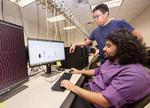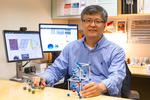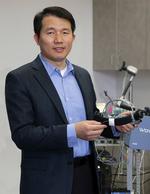Other

“University of Texas at Dallas computer scientists have devised a new weapon against video game players who cheat. The researchers developed their approach for detecting cheaters using the popular first-person shooter game Counter-Strike. But the mechanism can work for any …

“Researchers at The University of Texas at Dallas say drone technology has the potential to be a genuine game changer in the retail industry, with its promise to enable retailers to offer unheard-of delivery lead times and near-perfect delivery-time customization …

“A material composed of two one-atom-thick layers of carbon has grabbed the attention of physicists worldwide for its intriguing — and potentially exploitable — conductive properties. Dr. Fan Zhang, assistant professor of physics in the School of Natural Sciences and Mathematics at …

“Computer Scientists Create Framework That Tracks Down Hard-to-Find Variability Bugs One of the biggest challenges to fixing software bugs can be finding them. With support from the National Science Foundation, computer scientists at The University of Texas at Dallas are …

“Computers and similar electronic devices have gotten faster and smaller over the decades as computer-chip makers have learned how to shrink individual transistors, the tiny electrical switches that convey digital information. Scientists’ pursuit of the smallest possible transistor has allowed …

“If your laptop or cellphone starts to feel warm after playing hours of video games or running too many apps at one time, those devices are actually doing their job. Whisking heat away from the circuitry in a computer’s …

“A UT Dallas professor hopes to provide a voice to individuals who have no larynx and are unable to produce vocal sounds on their own. Dr. Jun Wang, assistant professor of bioengineering in the Erik Jonsson School of Engineering and …

“They die at the most inconvenient times. Cellphones go dark during important conversations because a battery hasn’t been recharged. Or the automotive industry revs up with excitement for a new battery-powered vehicle, but it needs frequent recharging. Or yardwork …

“An international research team led by scientists at The University of Texas at Dallas and Hanyang University in South Korea has developed high-tech yarns that generate electricity when they are stretched or twisted. In a study published in the Aug …

“A researcher with the Erik Jonsson School of Engineering and Computer Science at UT Dallas has designed a novel computing system made solely from carbon that might one day replace the silicon transistors that power today’s electronic devices. “The …

“Researchers at The University of Texas at Dallas have created an atomic force microscope on a chip, dramatically shrinking the size — and, hopefully, the price tag — of a high-tech device commonly used to characterize material properties. “A standard atomic force …

“Researchers at the Texas Analog Center of Excellence (TxACE) at UT Dallas are working to develop an affordable electronic nose that can be used in breath analysis for a wide range of health diagnosis. While devices that can conduct breath …

